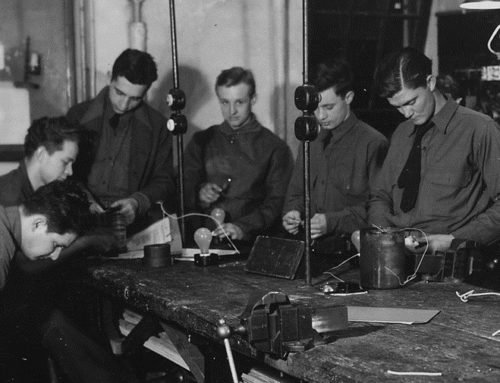by Laura Williams and Rob Reid
6 minute read
As Christmas comes around, you don’t have to be an eco-Grinch to sometimes stop and wonder at the way we go about our celebrations. For those of us involved in the energy sector, it’s almost inescapable. For example, everyone loves to see a sparkling Christmas tree decked with twinkling lights, while decorations in the town centre can really help put you in the festive spirit – but in many streets, the wattage of lights adorning the houses seems to be on a scale suited to ensuring the safe landing of a jumbo jet, never mind Santa’s sleigh.
Plenty of energy of all kinds goes into making Christmas special, but investing a little bit of brainpower can save a lot of electricity, and may just make your celebrations all the more memorable. Are you switched on to all the things you could be switching off? Are you turning down the opportunity to turn things down? Are you going to wake up with an energy bill hangover in the New Year? Our indispensable guide to enjoying an energy-saving Christmas is here to help.
Saving your baking
When preparing Christmas dinner it’s easy to get carried away. Christmas leftovers are so much of an expectation that there are vast tracts of the internet dedicated to recipes that will help you make use of all that uneaten turkey. By now, you’ll probably have laid in your food stocks, but it isn’t too late to take a clear-eyed look at what you’re really going to manage to put away on the day. Food is often easier to store before it’s been cooked, and any small scaling back of your culinary ambitions will avoid wasting energy on cooking things that will not be eaten – not to mention saving time in the kitchen that can be spent in good Christmas company.
Your freezer is your friend at Christmas. If you do decide that you’ve bought too much fresh produce, or if you have leftovers that are unlikely to get used quickly and just won’t fit in the fridge, they can do a useful job in the freezer: a well-stocked freezer is more energy efficient than an empty one. The leftovers can become ingredients for soups or other dishes in the New Year – and you’ll be avoiding seeing all the embodied energy from the food’s production, transport and cooking go to waste.
How’s the turkey doing? When will the bird be ready? It’s usually the part of Christmas dinner that takes the longest, but watched poultry never roasts – opening the oven door lowers the temperature by as much as 25 degrees, increasing cooking time and wasting energy as the oven tries to restore the pre-set temperature. If you’ve been getting by with a broken oven light, or trying to ignore the fact that you can barely see through the grimy oven door, fixing these problems before Christmas comes around could save you a lot of time and energy on the day.
If you can’t stand the heat…
With the oven on for hours, along with spuds and sprouts steaming away on the hob, the kitchen can get pretty sultry – especially if the heating’s on. How often have you ended up with the boiler churning away to warm the living room while the kitchen windows are wide open? With the family gathered together in the living room, and the kitchen blasting out warmth, it may well be possible to make better use of your heat. If you turn down radiators in the rooms that don’t need to be heated, the boiler won’t need to work so hard – and rather than letting all the kitchen’s heat out of the house, open interior doors through to other occupied rooms.

It cooks more quickly with the door closed… Photo: gottasharepics (Kathy Dempsey) (CC BY-NC 2.0) , via Flickr.
That lovely new Christmas jumper is also potentially an energy saving device. If it lets you turn the thermostat down by one degree, it will provide potential savings of £90 per year. Oh, and if you want to make the most of that warmth from the kitchen, you could turn the heating off for a while and open the oven door… preferably after cooking has finished!
Once you’ve stressed over its preparation and enjoyed the eating, then as sure as paper hats follow crackers, the joy of Christmas dinner is followed by the drudgery of washing up. For some, the dishwasher bears an uncanny resemblance to a member of the family wearing a pair of marigolds – but if you do have the luxury of an electric alternative, it can save energy.
Be sure to fill it up before completing a wash cycle, as one full cycle in a dishwasher costs the same in energy and water as heating four to six washing up bowls of water or running the hot tap continuously for up to nine minutes. A half load will use more than half the energy and water. If there’s not enough crockery for a full load, consider breaking out the rubber gloves – or you could ask your guests to bring plates as well as presents!
Entertaining at Christmas
After the washing up, for many people the time will have arrived when tradition dictates that they relax (and probably doze off) in front of the television while her Majesty does her thing. But there are other ways to entertain yourself, even when the days are short and the shops are shut – and remember, depending on its size, watching your television can cost you up to £33 in electricity each year.
A Christmas walk can easily become a tradition – and one that any canines in the family will appreciate – and of course, you don’t need to heat your house if the whole family is yomping through the fields, generating their own turkey-fuelled warmth. You can burn 100 calories for every mile walked, potentially giving you room for a slice of Christmas cake when you get back. Even if you’re not walking a dog, you can save energy by taking a carrier bag with you and picking up any littered bottles and cans you might find out on your walk – particularly if you’re heading out into the countryside. Aluminium and plastic are both energy intensive – so recycling a can, for example, saves 230g of CO2, the same as driving a family car for a mile.
Whether you’re going out for a local walk, or especially if you’re going further afield over the Christmas period, remember to switch off all appliances at the socket. Leaving products on standby costs the typical household £30 per year in wasted electricity. You could even try setting aside some gadget-free time, when the family switches off its various phones, tablets, pods and pads and gathers around a jigsaw or board game. That way, spending time together will really mean spending time together and help make the Christmas break really special.
These are just a few of the ways you can still save energy this Christmas, without cutting back on fun or behaving like the green police. When you’re preparing for next year, you could consider investing in some solar-powered LED Christmas lights – or even decide that Christmas isn’t all about the presents, and resist the lure of putting the latest electronic gadget on your Christmas list.
If you’re inspired to save energy this Christmas, we’d be delighted if you’d make the effort to tell us all about your suggestions – and hope that, however you spend the holidays, you enjoy them (responsibly, of course….)







Leave A Comment